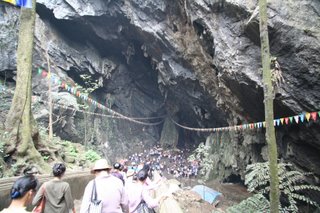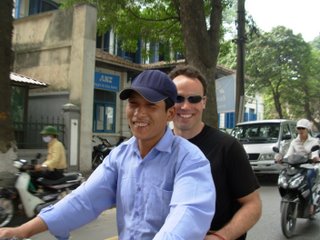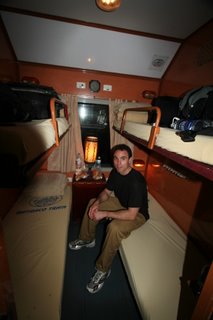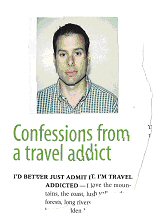Second Train a Charm?
 (Descending into the Perfume Pagoda).
(Descending into the Perfume Pagoda).The Perfume Pagoda, a Buddhist shrine in the Huong Tich Mountains of Northwest Vietnam, is not particularly well known for its enlightening lessons in economics. However, a valuable reminder would be proferred on our second day when we traveled to the Perfume Pagoda 60 kilometers outside of Hanoi. On our first day in town, we visited a few tour companies, all of whom offered the same trip for around the same price low low price of $15 per person including lunch. Seemed like a low output for high rate of return, generally good economics.
However, at 7:30 a.m. the following morning, a more valuable life reminder would trump the economics principle, time is money and sitting like cattle for six hours is no fun. A van that would comfortably seat ten in the US arrived at our hotel with two passengers already loaded. We climbed in and took our own bench. What we didn’t know is that we were only the second group to be picked up and would spend the next 45 minutes stopping at other hotels around the city. Slowly our van filled and the space between unsuspecting tourists disappeared and international borders of personal space were crossed. By the time the van was fully loaded, fifteen passengers total, the “English speaking” guide, Doang, introduced himself supposedly in English, but no one on the bus was sure. While Doang seemed to understand English, his tongue was not as learned as his ears. Fortunately, he was very kind and he tried very hard so everyone worked with him. Later we would learn that many guides are trained on this particular day trip.
For two hours, the van load of tourists unwillingly played chicken with oncoming traffic on a two-lane road into the countryside surrounded by green rice fields as far as the eyes could see interrupted only by the occasional outpost town or village. Arriving at My Duc, a small town on the Zen River, the van unloaded and the group shifted onto a long wooden boat powered by two oars in the hands of two women at each end of the boat. Apparently, most of the boats on the river were driven by women who were widowed or orphaned during the Vietnam War.

Coasting along the tullied waterway, limestone cliffs rose on both sides of the river creating a majestically serene setting. An hour down the river, we pulled off to a village of sorts seemingly supported by the presence of the tourist traffic journeying to see the Perfume Pagoda. Our group was presented with a choice of an hour plus walk to the pagoda or a tram ride for $2 each way. Most of the group, including Jason, chose to walk the pagoda path, I on the other hand, chose the tram as I was not feeling up to speed for the first time on my extended trip.
A modern clean well built tram suspended over lush foliage, the tram way seemed misplaced in the middle of a mountainous jungle with shacks and huts strewn below. Hoisted four kilometers over the pagoda path, I arrived less than a kilometer from the scented pagoda. I climbed and then descended the remaining thousand steps into a cave where hundreds of Vietnamese pilgrims were offering flowers, food, money, incense and milk to the candle lit Buddha statues inside. Men and women stood before the Buddha, hands in prayer formation in front of their face, eyes closed, chanting silently, but moving their lips. It was especially congested as our visit coincided with an annual festival taking place during the second lunar month when pilgrims make a special journey to the pagoda.
 (Further down in the Perfume Pagoda.)
(Further down in the Perfume Pagoda.)As in India, faith again surrounded me. Cooling off from the humid heat outside, I sat in the cave as part participant, part observer, marveling at the rituals and conviction of the praying pilgrims. Some of the faithful were women and men in their 70s and 80s, who traveled long distances from their villages to pray for healing, fertility for their grandchildren and harvest prosperity. They offered what little they had, even if only 200 Dong (Mere cents if even one cent). Faith was fast at work in the Perfume Pagoda.
Jason and I both returned on the tram where the tour group reunited for lunch. After our midday meal, we were treated to another nearby pagoda, but again due to the guide’s limited English it was hard to know the difference from one pagoda to another. It began to feel like “you’ve seen pagoda, you’ve seen them all.” Doang had lost his audience. Another hour boat ride back to the van and a two hour sardine ride back to Hanoi, we were ready for our first Vietnamese massage.
We walked into to the place closest to our hotel, a massage studio inside another hotel. Cognizant of stories of “extra service” massages, we inquired about the massage at the front desk. Figuring it was a hotel with legitimate frontage, we agreed to part with $5 each for the one hour massage which later would remind me of the adage, “you get what you pay for.” It wasn’t for lack of trying, but instead of deep tissue, every joint in my feet, legs, hips, back, fingers, shoulders and neck was cracked whether they wanted to or not and I wasn’t going to be let off the table until the masseuse was certain I could crack no more. It was more Mohican chiropractic session than massage as I lay on the table pondering my twisted fate, partial or complete paralysis or worse, death from cracking. My tombstone would read, “Here Lies Todd. Wasn’t All He Was Cracked Up To Be.” Good fortune on my side (and lots of bone fortifying milk as a young boy), I walked away without any permanent damage . . . I think.
Perfumed Out
One day in Hanoi under our belts, we were on to the tour circuit and we knew we wanted to get off. Sitting in a cramped van for hours with pre-planned tourist stops was not our cup of Vietnamese tea. No longer twenty years old and on a shoestring budget, we decided to seek a private tour and real English speaking guide. It was not difficult to do, and in fact, not much more expensive, however we still had to travel across a quarter of the country by train.
Visiting hill tribes in the northernmost Vietnamese province would require not one, but two overnight train trips. Vivid memories of overnight train travel in India fresh in my mind, I encouraged Jason to go first class to which he quickly obliged after my brief sorted sleepless tale. Ultimately, for peace of mind and rest, we bought four first class train tickets so we would have our own berth and get our best shot at some uninterrupted sleep.
Plan firmed with a booking agent and train not departing until 10 p.m., we had the afternoon and evening to see more of Hanoi, Vietnamese style. Jason and I would put ourselves at the mercy of two local moto drivers whose names we will never know. Five hours of swerving, threading between cars, buses and trucks was the best way to see the city. It was the “on-deck” circle of the baseball field, in the action, but not the center of attraction. Smiles involuntarily took over both of our faces as we sped around town stopping at points of attraction. We stopped only where and when we wanted, no guide, no bus tour, no nonsense. Sometimes the best experiences are unplanned.
 (Cruising in Hanoi.)
(Cruising in Hanoi.)As train time approached, we headed to the station, packs in tow. Immediately there were differences between the Hanoi and India stations. The Hanoi station was orderly, uncrowded and clean, the eternal spring of hope had sprung. This was not going to be a repeat sleepless performance.
 Finding our car was a cinch and it was even easier finding our berth. The berths were smaller than those on the train in India, but they were well appointed with wood paneling and mattress pads on the benches that were made after WWII. And we had the all important locking door, providing peace of mind from prospective bag snatchers while we slept. The train departed the station at the exact scheduled time and we made ourselves as comfortable as possible in our mobile hotel room for the night.
Finding our car was a cinch and it was even easier finding our berth. The berths were smaller than those on the train in India, but they were well appointed with wood paneling and mattress pads on the benches that were made after WWII. And we had the all important locking door, providing peace of mind from prospective bag snatchers while we slept. The train departed the station at the exact scheduled time and we made ourselves as comfortable as possible in our mobile hotel room for the night. (Hotel on Wheels)
(Hotel on Wheels)


<< Home